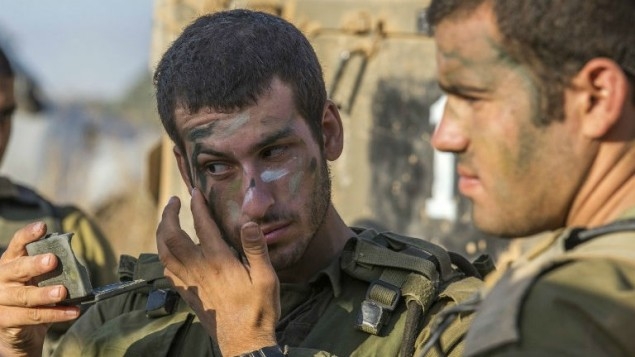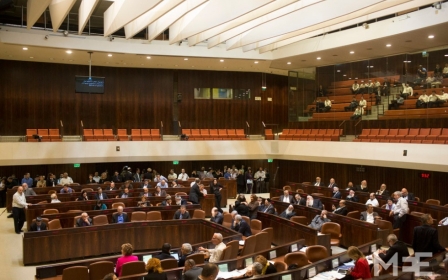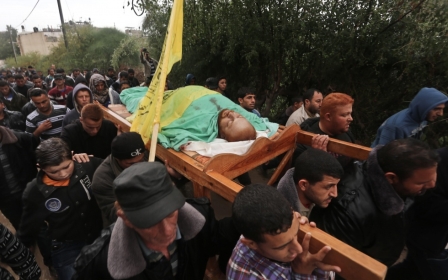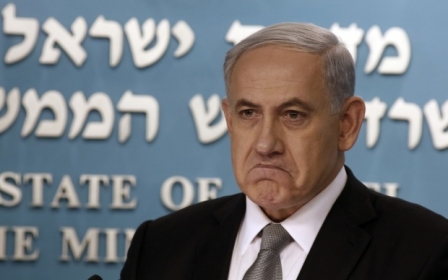Israeli schools help create a militaristic culture

In 2009, in the midst of an Israeli attack on Gaza, I facilitated dialogue between Jewish and Palestinian college students. The atmosphere was heated. The Jewish students supported the attack and the Palestinian students opposed it. Nevertheless, they were able to discuss their differences until the Palestinians said that the army is committing war crimes. That was the end of the dialogue. Jewish students, like the rest of society, were able to handle political differences but not criticism against the army. The army is sacred. Criticism of the army is taken personally.
What is the mechanism that makes the army in general and army service in particular so sacred? Israelis are constantly reminded of real and imaginary threats. Therefore it is only natural that citizens feel the need to participate in defending their country. But in 2013 the army announced that the motivation to serve was decreasing. It speculated that the reason for the decrease is that there are fewer and fewer threats surrounding Israel.
Like any organisation, the aim of the army is to continue to function and grow and for that they need to raise the motivation to serve. Simple logic leads me to conclude that it is in the army's interest to maintain a strong enough sense of threat. One of the forces that helps the army increase motivation to serve is the board of education which ensures that Israelis regard the cycle of violence as natural.
The Brazilian critical pedagogist Paulo Freire tells us that all education is political education. Education always teaches a certain worldview, and this worldview is then seen by the students as natural. Militaristic education therefore is political education and it teaches us to see wars and the military as central, inevitable and natural. This is relevant to Israeli society because serving in the army is not regarded as a means to enforce a certain political agenda – rather it is seen simply as good citizenship.
Army as a litmus test
I met young Jewish Israelis this week when they came to hear a lecture about models of equality between Jewish and Palestinian citizens of Israel. As usual with youth, the discussion quickly evolves to the one thing that is on their mind: “If you are talking about equality, then we want to know who serves and who doesn’t serve in the army.”
The army is their litmus test for good citizenship and patriotism. Any 18-year-old is measured through this lens. I talked with them about the small group of young Jews who refuse service as a form of protest against the Israeli occupation. They were furious: “Our grandfathers and fathers served and died for the country and for its security. It is our duty to do the same.”
They were not arguing with me about whether objecting to serve is a legitimate form of protest. I saw in front of me intelligent young people who were brainwashed and willing to sacrifice themselves blindly. It is hard to identify how militaristic Israeli society is because it is such a banal and natural part of our everyday life. When tourists visit from Western countries the first thing they mention are the soldiers and guns on the streets. Israelis, however, hardly notice these things. After last month’s violent attack on the synagogue in Jerusalem, many call for even more guns to be distributed to civilians for the sake of our “security”. There is a whole level of military presence that the tourists do not see.
When I was in the army 35 years ago, I worked in a kindergarten in the framework of my service. One of the little boys came up to the teacher and asked her quietly, ”Is Michal poor?” The teacher asked him why and he answered, “Because she comes in to work each morning in the same clothes.” I loved that story – the sensitivity of the little boy, his naive interpretation of the situation and the way he handled it. At the time it did not occur to me to consider the impact that my uniform may have been having on the psyche of the children, their identity and their culture.
Another example of militarism that sneaks into our schooling disguised as a good deed takes place during the Jewish holidays. It is customary on some of our holidays to prepare small packages of sweets and deliver them to friends and neighbours to show friendship and care. In many schools children in their early years are encouraged to bring such “care packages” for our beloved soldiers. We know that Israel's military budget actually covers the soldiers' needs fairly well. The concern here is not for them. The message is to the children: we love and support whoever dedicates his or her life to our safety. Service is a good thing and when you grow up you will also be supported and appreciated.
Very few parents see a problem with this tradition and even fewer dare tell the teacher that they are not willing to participate in such subtle militarism. Care packages for soldiers and young women in uniforms performing daily chores, such as playing with children and helping them with their homework, are strong forms of socialisation because they are part of the daily routine. But it does not stop there.
"Preparation for a meaningful service"
The board of education promotes a three-year programme in Jewish (and Druze) public schools dedicated to “preparation for a meaningful service”. The programme was prepared in cooperation with the army and it is partially sponsored by the army. If we look at the programme we can see that the schools are dedicating time and effort to advance what they call “values of meaningful contribution to the state and to society”. Meaningful contribution is connected to good citizenship, which is connected to sacrifice and heroism. In this context "sacrifice", for the most part, has to do with violence and death.
The programme, however, is formulated in a sterile language that rarely refers directly to violence and death – especially not to the violence and death that is being perpetrated by the soldiers themselves. It appears as though the schools are working for the army in preparing, informing, motivating and supporting the soldiers of tomorrow.
The programme informs and prepares the students for their army registration, interviews and testing. It presents them with the opportunities offered in the army, helps them choose a unit and supports them emotionally and morally. Teachers run the programme with help from officers who come to the school and from soldiers who accompany the students and tend to their needs.
In Jewish-Israeli schools, most of the teachers are women, adding a whole level of “normalcy” to the masculine militaristic culture. Schools with a low percentage of students who serve get a bonus: a week in an army camp. This boot-camp experience is the highlight of the preparation. Its aim is to increase motivation to serve and encourage the students to choose a “meaningful” service – a euphemism for encouraging students to enlist in combat units.
The army preparation programme must be seen in context. In the last three years of high school, the Jewish school curriculum includes important social topics such as substance abuse and gender equality. The curriculum also includes the study of the Holocaust and a trip to Poland. This special trip to the concentration camps and to the sites of Jewish communities that have been destroyed is much more than a historical journey. The trips began in the late 1980s and they combine historical, moral and educational goals. These goals are defined as “Jewish-Israeli-Zionist and universal”. Two liberal ministers of education who were worried that the trips would exaggerate nationalistic values and behaviour added the universal elements to the programme in the 1990s.
One research paper (Kimhi, 2011) compared the attitudes of participants before and after these trips. It showed that the trips increased the youths' pride in and love for their country. As a result of the trip, they were less inclined to want to leave Israel. To some extent, the trip also enhanced universal values, making them more sensitive towards the rights of minority groups …or at least towards the rights of other countries’ minority groups. When it comes to Israel, after returning from Poland, they tended to see Arabs as even more of a threat. They feel more in danger from them and want to distance themselves more from Arabs. The paper found that the trip actually increases their belief that rights should be taken away from the Arab citizens of Israel.
The preparation for the army is therefore intertwined with this strong and often manipulative study-trip. It is no surprise that the same schools that tend to take their students to Poland also show a high motivation to enlist and serve. These two educational programmes work to ensure that the motivation to serve does not decrease further.
A glimmer of hope
I began by describing how natural and central military service is in Israeli culture. However only 50 per cent of those who are obliged to serve actually enlist, mainly due to the Orthodox Jewish community – which has low motivation to serve and until only recently was exempt from military service – and youth from low socio-economic groups who the army does not want. In 2020, half of the citizens who will be eligible to vote for the Israeli parliament will be Arabs and Orthodox Jews – two communities that do not serve. It will be interesting to see how these demographics influence the public discourse, politics and the militarism of the state.
It is clear that those who do serve – youth from middle and high socio-economic groups – have limited possibilities to question their choices. The pressure on them is enormous. Motivation has become an issue because of a growing capitalist culture that encourages young people to think more of their individual benefits and less of the collective. This is the reason that the state, through its board of education, is putting so much effort on raising motivation. Liberal schools and teachers, like the liberal ministers of education in the 1990s, are concerned but not particularly courageous. The most that they do is to add universal values to the preparation process. No one dares defy the process altogether.
I want to end with a story of defiance, which, together with the demographic projections, can give hope.
When one of my daughters announced at her liberal high school that she would not serve in the army, her teachers called her for a heart-to-heart talk. They were worried about her and wanted to know if she had reached this decision on her own or was pressured and brainwashed to refuse. Without hesitation, she asked the teachers if they intended to invite each one of the students for such a discussion in order to make sure that they had decided to go to the army independently or had felt pressured to choose the military path as the natural course of life.
-Michal Zak is a political educator, an expert in Jewish-Palestinian dialogue and a resident of the Palestinian-Jewish community of Wahat al Salam-Neve Shalom in Israel.
The views expressed in this article belong to the author and do not necessarily reflect the editorial policy of Middle East Eye.
Photo credit: Israeli army soldiers camouflage their faces (AFP)
New MEE newsletter: Jerusalem Dispatch
Sign up to get the latest insights and analysis on Israel-Palestine, alongside Turkey Unpacked and other MEE newsletters
Middle East Eye delivers independent and unrivalled coverage and analysis of the Middle East, North Africa and beyond. To learn more about republishing this content and the associated fees, please fill out this form. More about MEE can be found here.





